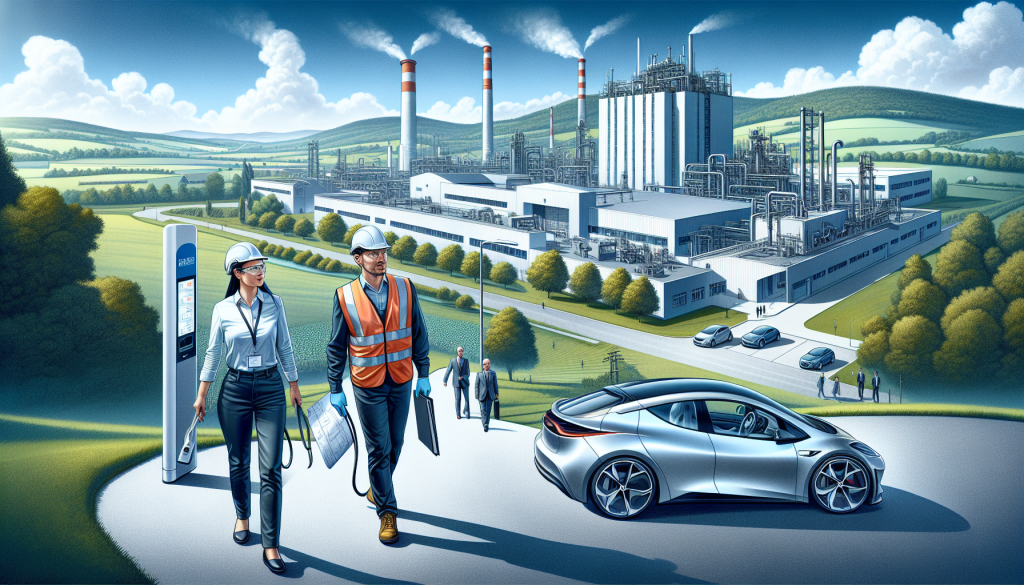Imagine a future where electric vehicles are not only the norm, but also manufactured on a massive scale. BYD, the renowned Chinese automaker, is taking a groundbreaking step towards this reality with their latest endeavor: the construction of their first European electric vehicle factory in Hungary. This game-changing move promises to revolutionize the industry by making electric vehicles more accessible to European consumers and reducing carbon emissions on a significant scale. With this new factory, BYD is set to become a major player in the European electric vehicle market, igniting excitement and anticipation among both car enthusiasts and environmentalists alike.
BYD’s First European Electric Vehicle Factory in Hungary: A Game-Changer in the Industry
BYD, a renowned Chinese electric vehicle manufacturer, has recently made a groundbreaking move by establishing its first European electric vehicle factory in Hungary. This bold step is set to revolutionize the industry and strengthen BYD’s position in the European market. In this article, we will delve into the background of BYD, the factors behind Hungary’s selection as the factory location, the production capacity and timeline, collaboration with local suppliers, job creation and economic impact, environmental considerations, technological innovation, potential challenges, and the future outlook for BYD in Europe.

1. Background of BYD
1.1 History and Overview
BYD, short for Build Your Dreams, was founded in 1995 and has since become a global leader in the electric vehicle (EV) industry. Originally focused on manufacturing rechargeable batteries, BYD quickly expanded into the automotive sector and started producing electric cars. With its commitment to innovation, quality, and sustainability, BYD has earned a solid reputation in the market and has gained recognition for its cutting-edge technology.
1.2 Expansion into the European Market
With the rising demand for electric vehicles worldwide, BYD recognized the need to expand its presence in the European market. Europe has emerged as a key market for EVs, with countries like Germany, Norway, and the Netherlands leading the way in adoption. BYD’s decision to establish its first European EV factory in Hungary is a strategic move to capitalize on this growing market potential while also leveraging Hungary’s favorable business environment and supportive government policies.
2. Choice of Hungary for the Factory
2.1 Factors Considered by BYD
When selecting the location for their European EV factory, BYD carefully evaluated various factors. Hungary’s central location within Europe, well-developed infrastructure, skilled and cost-effective labor force, favorable investment climate, and strong government support made it an ideal choice for BYD’s expansion plans. The country’s strategic position enables easy access to major European markets, ensuring efficient distribution of vehicles throughout the continent.
2.2 Hungary’s Advantages as a Manufacturing Hub
Hungary has established itself as an attractive manufacturing hub within Europe due to its robust industrial base and favorable business environment. The country prioritizes innovation, technology, and investment, making it an ideal destination for companies looking to establish production facilities. Moreover, Hungary offers substantial incentives and tax benefits to attract foreign investment, which further strengthens its appeal for companies like BYD.
3. Factory Location and Facilities
3.1 Selection of Site
BYD carefully assessed various potential sites before finalizing the location for their European EV factory. Debrecen, located in eastern Hungary, emerged as the chosen site. Debrecen’s strategic positioning, well-developed infrastructure, access to an extensive supply chain network, and availability of skilled labor were key factors in the decision-making process. Additionally, Debrecen provides ample space for future expansions, allowing BYD to scale up production as demand increases.
3.2 Overview of Factory Facilities
The BYD European EV factory in Debrecen boasts state-of-the-art facilities equipped with the latest manufacturing technologies. The plant spans a significant area, providing ample space for production lines, assembly units, and administrative offices. The factory incorporates sustainable practices, prioritizing energy efficiency, waste reduction, and the use of environmentally friendly materials. The production process is optimized to ensure high-quality vehicles while minimizing resource consumption and emissions.
4. Production Capacity and Timeline
4.1 Initial Production Capacity
The Debrecen factory has an initial production capacity of [insert figure] units per year. This considerable capacity equips BYD to meet the growing demand for electric vehicles in Europe while ensuring timely deliveries to customers. The state-of-the-art production lines, coupled with BYD’s expertise in manufacturing electric vehicles, ensures efficient and reliable production processes. This capacity will contribute significantly to the expansion of EV adoption and support Europe’s sustainability goals.
4.2 Future Expansion Plans
Driven by its ambitious growth strategy, BYD plans to expand its production capacity in Debrecen in the coming years. The company recognizes the potential for exponential growth in the European EV market and aims to meet the increasing demand by scaling up its manufacturing capabilities. This expansion will not only strengthen BYD’s foothold in Europe but also contribute to job creation and economic prosperity in the region.
5. Collaboration with Local Suppliers
5.1 BYD’s Commitment to Local Sourcing
BYD firmly believes in nurturing local economies and fostering partnerships with local businesses. As part of its commitment to sustainable practices and supporting the Hungarian economy, BYD prioritizes local sourcing of materials and components. This approach ensures shorter supply chains, reduces carbon emissions associated with transportation, and provides economic opportunities for Hungarian suppliers.
5.2 Partnership with Hungarian Suppliers
BYD has forged strategic partnerships with Hungarian suppliers to meet its production needs for the Debrecen factory. These local suppliers play a crucial role in the value chain, providing quality components, parts, and services necessary for the manufacturing process. Through this collaboration, BYD not only ensures a reliable supply of materials but also strengthens the local economy by fostering innovation, creating jobs, and promoting knowledge transfer.
6. Job Creation and Economic Impact
6.1 Number of Jobs Created
The establishment of the BYD European EV factory in Hungary has resulted in a significant number of job opportunities. The factory is expected to create substantial employment, directly and indirectly, throughout the value chain. Skilled workers, engineers, technicians, administrative staff, and support personnel will be needed to manage the operations, ensuring a positive impact on the local workforce and job market.
6.2 Contribution to the Hungarian Economy
By choosing to establish their EV factory in Hungary, BYD has made a noteworthy contribution to the Hungarian economy. The investment in the factory and the subsequent job creation will stimulate economic growth, enhance local industrial capabilities, and attract further investments and technological advancements. Additionally, the production of electric vehicles aligns with Hungary’s commitment to reducing carbon emissions and transitioning towards a greener economy.
7. Environmental Considerations
7.1 Sustainable Manufacturing Practices
Sustainability lies at the core of BYD’s operations, and the European EV factory in Hungary stands as a testament to this commitment. The factory incorporates sustainable manufacturing practices, ensuring efficient energy consumption, waste reduction, and recycling processes. BYD’s focus on minimizing the environmental impact of production aligns with Europe’s sustainable development goals and contributes to a greener future.
7.2 Reduction in Carbon Emissions
One of the key benefits of producing electric vehicles is the significant reduction in carbon emissions compared to conventional combustion engine vehicles. BYD’s European EV factory will contribute to a substantial decrease in carbon emissions by manufacturing electric vehicles powered by clean energy sources. This aligns with Europe’s efforts to combat climate change and reduce the transportation sector’s carbon footprint.
8. Technological Innovation in the Factory
8.1 Advanced Manufacturing Technologies
BYD’s European EV factory in Hungary incorporates advanced manufacturing technologies to optimize production processes and ensure the highest quality standards. Automated assembly lines, precision robotics, and cutting-edge manufacturing equipment enhance efficiency, accuracy, and productivity. By leveraging advanced technologies, BYD stands at the forefront of the industry, setting new benchmarks for operational excellence and innovation.
8.2 Integration of Smart Systems
To streamline operations and improve overall performance, BYD integrates smart systems within the European EV factory. These intelligent systems enable real-time monitoring, data analysis, and predictive maintenance, ensuring smooth operations and minimizing downtime. Smart systems also enhance safety, optimize energy consumption, and support BYD’s commitment to sustainable manufacturing practices.
10. Potential Challenges and Future Outlook
10.1 Competitive Landscape
In a highly competitive market, BYD faces challenges from both established automakers and emerging EV manufacturers. However, BYD’s long-standing experience, technological expertise, sustainable practices, and commitment to innovation position it well to tackle these challenges head-on. With its first European EV factory in Hungary, BYD demonstrates its determination to meet the evolving market demands and emerge as a dominant player in the European electric vehicle industry.
10.2 BYD’s Strategy for Success
BYD’s strategy for success hinges on several key factors, including continued investment in research and development, product diversification, strategic partnerships, expansion of production capacity, and customer-centric approach. By prioritizing sustainable practices, technological innovation, and collaboration with local suppliers, BYD aims to establish itself as a sustainable pioneer and a preferred choice for electric vehicles in Europe and beyond.
In conclusion, BYD’s first European electric vehicle factory in Hungary marks a significant milestone in the industry. This game-changing move not only strengthens BYD’s foothold in the European market but also brings forth numerous benefits, including job creation, economic growth, technological innovation, and environmental sustainability. With its relentless pursuit of excellence and commitment to sustainable mobility, BYD is poised to shape the future of electric vehicles and contribute to a greener and more sustainable world.





